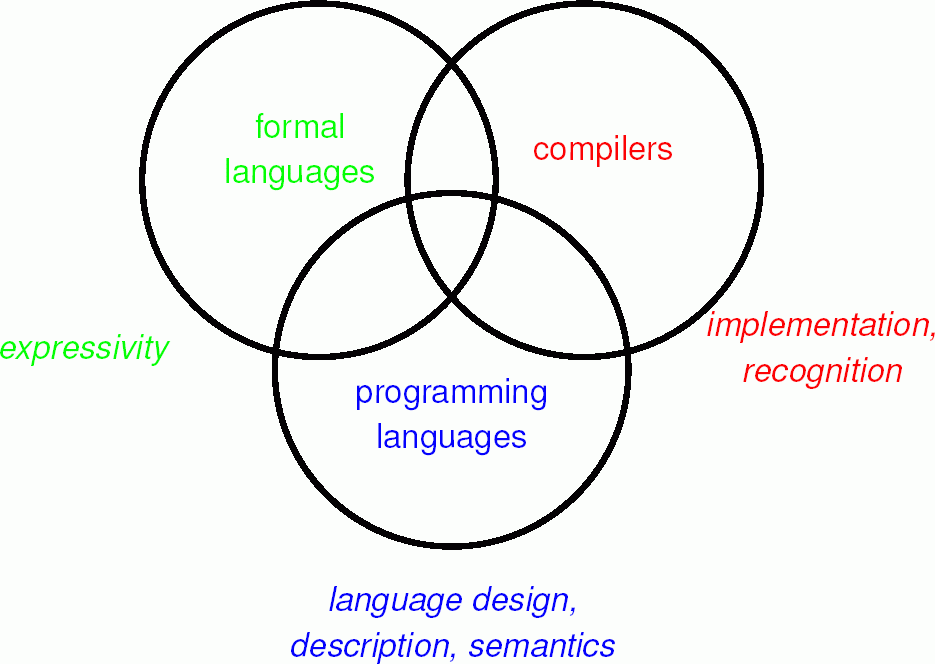
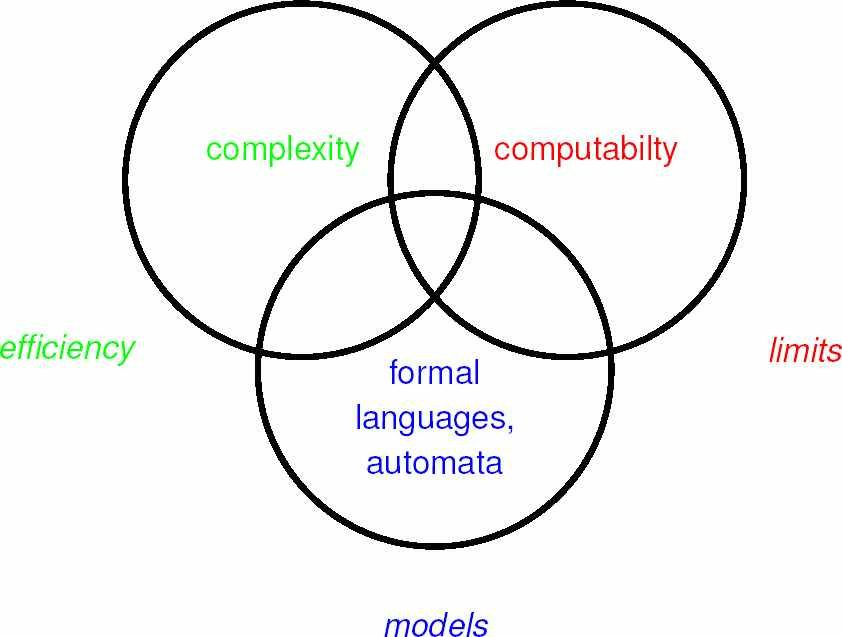
Check my WWW page for up to date information, you are always welcome to send me e-mail.
Lectures are from 2pm to 2:50pm Mondays, Wednesday, and Fridays in OEC, room 118.
CSE 4083 Formal Languages and Automata Theory. Presents abstract models of computers (finite automata, pushdown automata and Turing machines) and the language classes they recognize or generate (regular, context-free and recursively enumerable). Also presents applications of these models to compiler design, algorithms and complexity theory. Prerequisite: CSE 2010.


Mathematical sophistication is required, in particular discrete math. There will be no programming projects.
The textbook for the class is:
| Linz |
Peter Linz. Introduction to Formal Languages, and Automata, sixth edition. Sudbury, Massachusetts: Jones & Bartlett, 2017. ISBN-13: 978-1-284077247 |
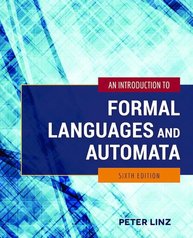 |
Other books are similar and cover the same material. In particular the book by Hopcroft, Motwani, and Ullman (HMU) is very similar, and sometimes used as the textbook in this course.
| Hopcroft |
John E. Hopcroft, Rajeev Motwani, and Jeffrey D. Ullman. Introduction to Automata Theory, Languages, and Computation, third edition. Boston, Massachusetts: Pearson/Addison Wesley, 2007. ISBN-13: 978-0-321-45536-3 |
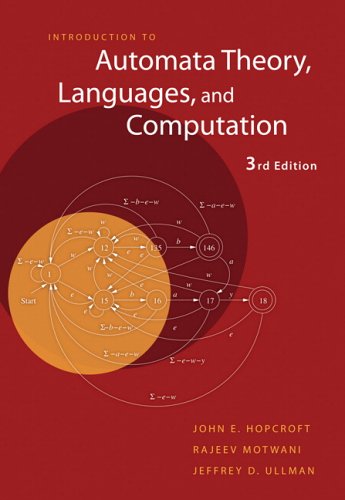 |
| Kozen | Dexter Campbell Kozen. Automata Theory and Computability. New York: Springer, 1997. ISBN: 978-1-4612-7309-7. DOI 10.1007/978-1-4612-1844-9 |
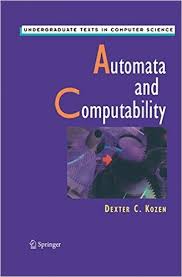 |
| Harrison | Michael A. Harrison. Introduction to Formal Language Theory. 1978. |
 |
| Martin | John C. Martin. Introduction to Languages and the Theory of Computation, fourth edition. New York, New York: McGraw-Hill, ©2011. ISBN: 9780073191461. |
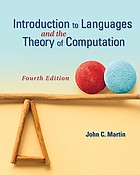 |
| Sudkamp | Thomas A. Sudkamp. Languages and Machines: An introduction to the Theory of Computer Science, third edition. Boston, Massachusetts: Pearson/Addison-Wesley Education, 2006. ISBN: 9780321322210. |
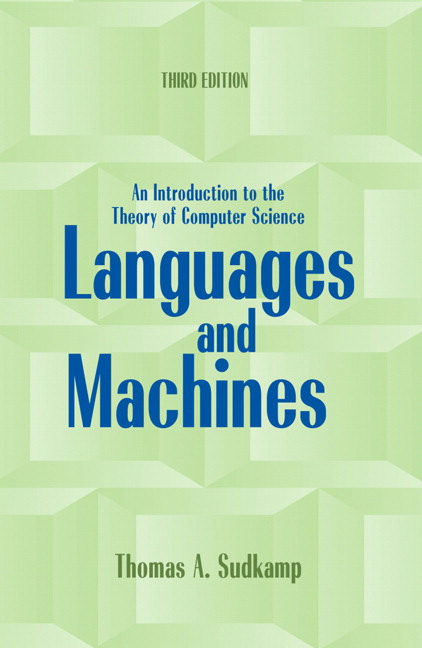 |
| Floyd |
Robert W. Floyd and Richard Beigel. The Language of Machines: An introduction to the Computability and Formal Languages, ? edition. New York: New York: Computer Science Press, 1994 ISBN: 9780716782667. |
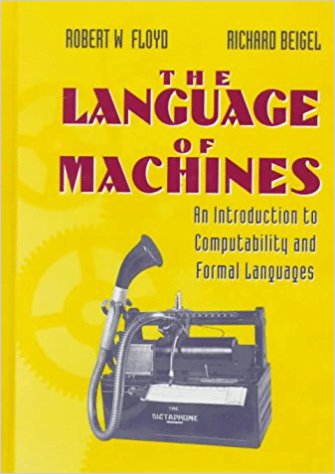 |
| Goddard |
Wayne Goddard. Introducing the Theory of Computation. DOI ISBN: 9780763741256. Sudbury, Massachusetts: Jones & Bartlett, 2008. |
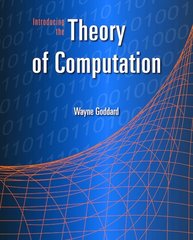 |
| Singh |
Arindama Singh. Elements of Computation Theory. DOI ISBN: 978-1-84882-497-3. London: Springer, 2009. |
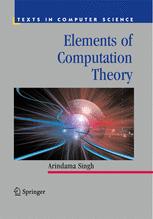 |
| MacCormick |
John MacCormick. What Can be Computed? A Practical Guild to the THoery of Computation. | 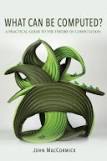 |
| math | automata | grammar | expressions | properties | |
|---|---|---|---|---|---|
| Introduction | 1.1 | 1.2 | |||
| Regular | 2 | 3.3 | 3.1, 3.2 | 4 | |
| Context-Free | 7 | 5, 6 | algebra | 8 | |
| Context-Sensitive | 10.5 | 11.3 | |||
| Recursive enumerable | 9, 10 | 11.2 | λ | ||
| Chapter 13: Other Models of Computation | |||||
| Chapter 14: An Overview of Complexity Theory | |||||
| math | automata | grammar | expressions | properties | |
|---|---|---|---|---|---|
| Introduction | 1 | ||||
| Regular | 2 | Ex 5.1.4 | 3 | 4 | |
| Context-Free | 6 | 5 | algebra | 7 | |
| Context-Sensitive | LBA | CSG | |||
| Recursive enumerable | 8 | λ | |||
| Chapter 10: Intractable Problems | |||||
| Chapter 11: Additional Classes of Problems | |||||
I think the ones by Busch are the best and I have provided Panopto recordings. Ullman's follows his own book, of course, and so are not focused on the way this class is organized. Linz' notes are not as extensive at Busch's. Each grid is cross-listed with Wikipedia articles which are often quite good on these topics.
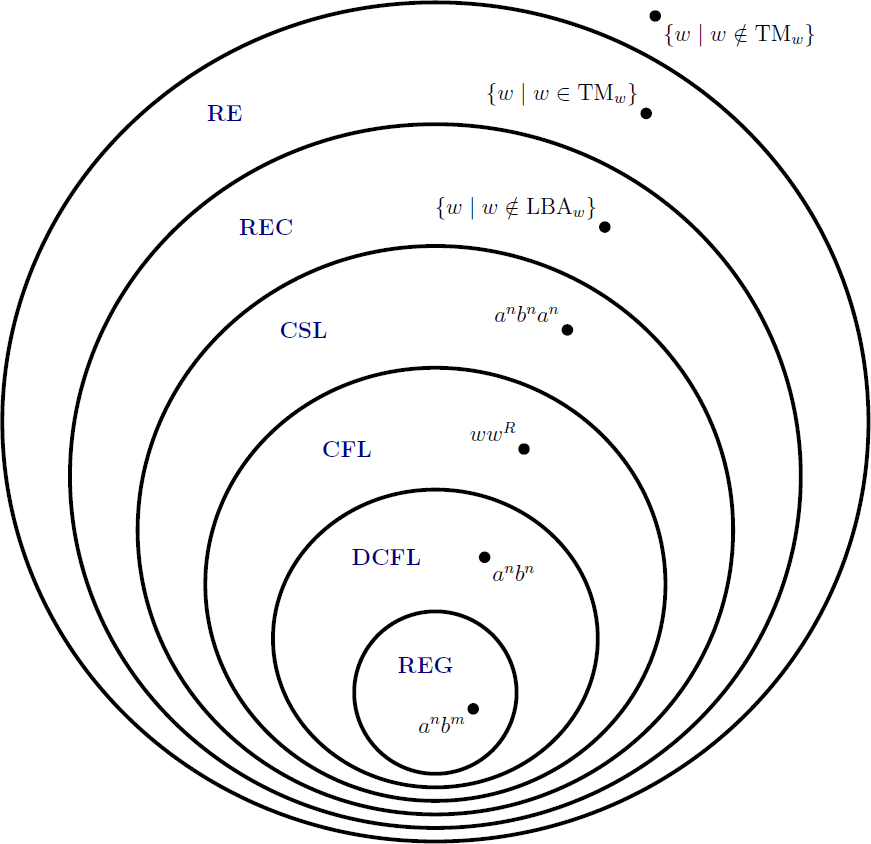


| Monday, 8 January August 2024 | First lecture |
| Friday, 12 January 2024 | Asgn #1 |
| Sunday, 14 January 2024 | World Logic Day death of Gödel; birth of Tarski |
| Monday, 15 January 2024 | Martin Luther King Jr. Day (no classes) |
| Friday, 19 January 2024 | Asgn #2 |
| Friday, 26 Janary 2024 | Asgn #3 |
| Friday, 2 Febrary 2024 | Asgn #4 |
| Monday, 5 February 2024 | Midterm Exam #1 Chapters 1,2,3,4 |
| Friday, 9 February 2024 | Asgn #5 |
| Friday, 16 February 2024 | Asgn #6 |
| Friday, 23 February 2024 | Asgn #7 |
| Thursday, 29 February 2024 | Leap Day. Rata Die 738,945 |
| Friday, 1 March 2024 | Asgn #8 |
| Monday, 4 March 2024 | Midterm Exam #2 Chapters 5,6,7,8 |
| Sunday, 10 March 2024 | Daylight Savings Time begins |
| Friday, 15 March 2024 | Asgn #9 |
| Friday, 22 March 2024 | Asgn #10 |
| 25-29 March 2024 | Spring Break (no classes) |
| Monday, 8 April 2024 | Eclipse (class canceled) |
| Wednesday, 24 April 2024 | Last lecture |
| Thursday, 2 May 2024 | Final Exam, 1-3pm |